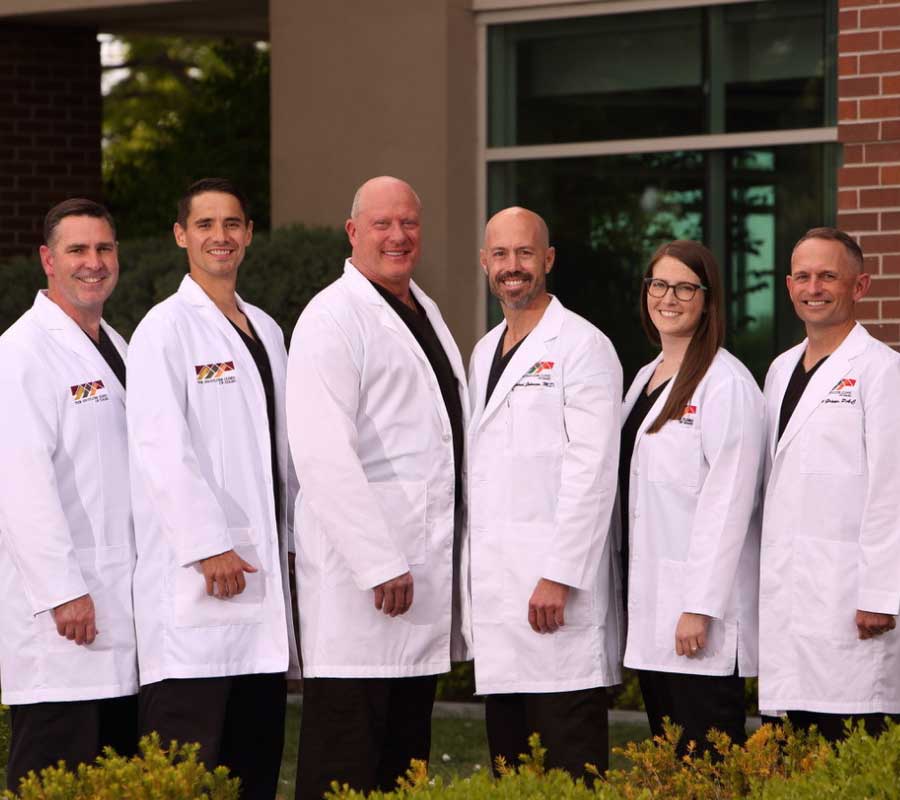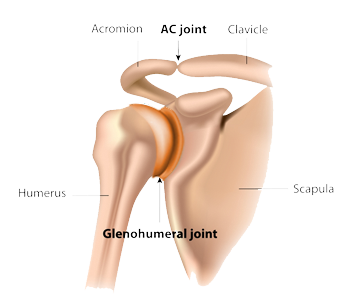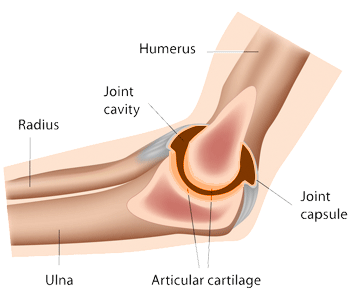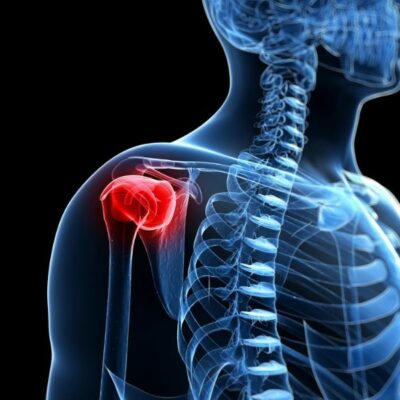Shoulder Arthritis Specialists

Are you experiencing mild to severe shoulder pain that typically worsens with activity? If so, you may have shoulder arthritis. Arthritis of the shoulder is typically found in middle-aged adults and the older population due to the natural aging process. The shoulder arthritis specialists at Shoulder Clinic of Idaho provide diagnosis and both surgical and nonsurgical treatment options for patients in the Boise area who have developed shoulder arthritis. Contact the Shoulder Clinic of Idaho team today!
What is shoulder arthritis?
Arthritis is a common ailment in the United States, over 50 million people have been diagnosed with some form of the disease. The shoulder is the third most common joint affected by arthritis, after the hip (#2) and the knee (#1). Arthritis can occur in any joint in the body and refers to a condition where there is bone-on-bone, or the loss of cartilage between the bones of the shoulder joint. Cartilage is the smooth covering on the ends of the bones that aid in joint movement and help the bones glide and move easier without pain. This cartilage covers both sides of the shoulder joint -the ball and socket joint -known as the humeral head (ball) and glenoid (socket). When the cartilage becomes worn or damaged, this can lead to shoulder arthritis and chronic pain. Bone spurs (osteophytes), bone cysts, dense bone (sclerosis), and joint space narrowing are classic findings of arthritis in the shoulder joint. The orthopedic specialists at The Shoulder Clinic of Idaho are dedicated to helping patients in Boise, Meridian, Nampa, and the surrounding communities of the Treasure Valley suffering from shoulder arthritis.
What are the types of shoulder arthritis?
Within the shoulder there are two different joints that can be affected by arthritis. The acromioclavicular joint (AC joint), where the clavicle (collarbone) meets the acromion (bony roof of the shoulder); and the glenohumeral joint, where the ball of the humerus (arm bone) meets the glenoid (shoulder socket). These joints can be affected by one or more of the following types of shoulder arthritis:
Osteoarthritis – Often called “wear and tear” arthritis, happens over time, generally in older adults. Dislocations, fractures, genetics and instability from micro-trauma, can all contribute as causes of osteoarthritis. The protective covering of cartilage wears away over time and the bones of the shoulder rub together causing pain and inflammation.
Rheumatoid Arthritis – This type of arthritis can attack any joint in the body and is considered an auto-immune disease. It occurs when the body’s own immune system attacks its own cartilage and destroys it. It also causes swelling of the synovial lining, which lubricates the joint, causing pain and stiffness. Rheumatoid arthritis is genetic and seen more often in women than in men. This type of arthritis typically is erosive and usually does not develop large bone spurs or osteophytes as commonly seen in osteoarthritis or secondary arthritis.
Secondary Arthritis or Post-traumatic Arthritis – This type of shoulder arthritis develops after an injury to the joint such as a dislocation or fracture. Post-traumatic arthritis is a form of arthritis in which prior-damage causes the cartilage surface to wear away due to mechanical and structural changes in the shoulder.
Rotator cuff arthritis or Rotator cuff tear arthropathy – This type of shoulder arthritis develops secondary to a rotator cuff problem such as an acute or chronic rotator cuff tear tendon. If the rotator cuff tendon and muscles are not working properly, this can lead to abnormal mechanics and abnormal wearing of the shoulder resulting in pain, weakness and difficulty raising one’s arm.
What are the symptoms of shoulder arthritis?
- Shoulder pain can vary from a minimal dull ache, to sudden and intense episodes of sharp pain.
- Pain, centered in the back of the shoulder, commonly felt down the arm to the elbow, can occur with glenohumeral arthritis
- Pain on the top or front of the shoulder can indicate arthritis in the AC joint
- Weakness can be present with rotator cuff tear arthropathy or secondary to pain
- Stiffness in the joint is common
- Difficulty lifting or moving the arm, especially overhead and behind one’s back
- A grinding or catching sensation in the shoulder can be experienced
- Night pain may be common after the joint has experienced a lot of movement during the day
How is arthritis of the shoulder diagnosed?
The Shoulder Clinic of Idaho’s orthopedic shoulder specialists will conduct a thorough patient history and physical examination. They will rotate and move the shoulder, checking for areas of pain or tenderness, and will assess the mobility of the joint. A variety of tests may be used to confirm the diagnosis, including X-rays and an MRI scan. These studies, if obtained, may also be used to help guide treatment of your shoulder arthritis.
What are the treatment options for shoulder arthritis?
The goal in treating shoulder arthritis is to reduce or eliminate the underlying symptoms associated with the condition. This includes alleviating the pain, swelling, and overall stiffness of the shoulder joint. This can be accomplished by both surgical and non-surgical treatments. Patients in Boise, Meridian, Nampa, and the surrounding communities of the Treasure Valley will have several treatments options available to them at The Shoulder Clinic of Idaho.
Non-Surgical Treatment:
Some patients may choose to monitor the side effects and pain of shoulder arthritis for years before seeking treatment. Patients can lessen the severity of shoulder pain and stiffness by:
- Resting the shoulder joint
- Applying ice to the joint
- Using moist heat on the shoulder
- Taking NSAIDs (Non-steroidal anti-inflammatory) medications as prescribed by your doctor
- Receiving a corticosteroid injection in the shoulder
- Performing physical therapy
Surgical Treatment:
Shoulder arthritis may require surgery if conservative treatments have failed to alleviate pain symptoms. Surgical treatment options will vary, depending on the patient’s age, level of activity, severity of arthritis and intensity of shoulder symptoms. Some of the surgical options available at The Shoulder Clinic of Idaho include:
Arthroscopy of the shoulder – Mild glenohumeral arthritis can be treated with a minimally invasive procedure using small incisions and a small camera placed inside the joint. Special surgical instruments are used to remove the inflamed synovial lining (synovitis) and remove pieces of damaged cartilage by smoothing the shoulder joint. Arthroscopic surgery may also be performed to help treat associated shoulder stiffness from a tight shoulder capsule. While this treatment will not cure the shoulder arthritis and may not prevent further arthritic damage, it can relieve associated pain and symptoms in the short term is certain patients.
Arthroplasty – also called Shoulder Replacement Surgery, is used in severe cases of shoulder arthritis. During this surgery, the arthritic ball of the shoulder is replaced by a metal ball called a prosthesis. The ball is then attached to a metal stem which goes inside the humerus (arm bone) to keep the new ball in a stable position. The arthritic shoulder socket is covered by a smooth plastic socket. The motion of the metal ball on the smooth plastic socket prevents shoulder pain and inflammation that is commonly experienced with bone-on-bone arthritis.
A shoulder arthroplasty may last 10 to 20 years. Therefore, The Shoulder Clinic of Idaho will also consider other joint restoration and joint preservation techniques that may be helpful to alleviate symptoms of an arthritic shoulder.
For additional resources on shoulder arthritis, or to learn more about treatment options for shoulder pain in Boise, Meridian, Nampa, and the surrounding communities of the Treasure Valley, please contact The Shoulder Clinic of Idaho.



